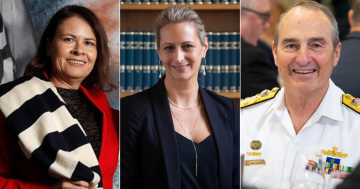 1. This week 10 years ago, the National Archives of Australia announced it would receive a collection of records about Australian prisoners of war held by the Japanese since World War II.
1. This week 10 years ago, the National Archives of Australia announced it would receive a collection of records about Australian prisoners of war held by the Japanese since World War II.
Minister for Foreign Affairs, Bob Carr said once the more than 16 volumes of records that included name-identified files and information were repatriated to Australia they would be handed over to the Archives and carefully prepared for public access.
Minister for Veterans’ Affairs, Warren Snowdon said the records would provide families with previously unseen information about their loved ones and help identify where a prisoner was held, the date of capture and date of liberation.
2. Video content from the ABC archives made history by being released directly to Wikimedia Commons, a media file website that makes public domain and freely licensed educational media content freely available.
Director of ABC Innovation, Angela Clark said it was the first time an Australian broadcaster (commercial or public) had donated video footage directly to Wikimedia, making it available to the public under a Creative Commons licence.
When users upload a file to Wikimedia Commons they give anyone the licence to use, copy, remix and adapt the content.
Ms Clark said the development built on the ABC’s Open Archive initiatives that had previously been adopted to open ABC archives to the public.
3. The Commonwealth Scientific and Industrial Research Organisation (CSIRO) and aircraft manufacturer Boeing developed a five-year, $25 million strategic research program for innovation in space sciences, advanced materials, energy and direct manufacturing.
The agreement was part of the 23-year partnership between the CSIRO and Boeing.
During that time the organisations had invested about $110 million between them to develop world-leading technological innovations in aviation fuels, aircraft assembly processes, fire retardants, and aircraft maintenance management software.
4. The Australian Federal Police (AFP) unveiled the AFP Innovation Centre, one of the first of its kind in the Government sector, which aimed to enhance innovative thinking in the field of Information and Communications Technology (ICT).
Chief Technology Officer at the AFP, Scott MacLeod said the Centre would provide a strong foundation for the AFP to lead the way in emerging technological concepts.
“The Centre positions the AFP at the forefront of new and emerging technologies and will play an integral role in enhancing the AFP’s crime-fighting capability,” Mr MacLeod said.
5. Victorian Minister for Police, Peter Ryan announced the establishment of a new multi-Agency Multidisciplinary Centre in Geelong to investigate sexual assault, provide specialised support to victims and focus on child abuse crimes.
Mr Ryan said the Centre would incorporate Victoria Police, child protection authorities, and specialised counselling services for sexual assault and child abuse victims.
“Child abuse and sexual assault are abhorrent crimes, and the Government is taking measures to ensure victims have the support they need and that perpetrators of sexual abuse are brought to justice,” Mr Ryan said.
6. And a decade ago in Western Australia, Premier, Colin Barnett announced the new Ngari Capes Marine Park to preserve and protect important marine habitats and some of the South-West’s top surfing locations.
Mr Barnett said the marine park would cover about 124,000 hectares and extend from Geographe Bay near Busselton to Augusta, including the waters between Cape Naturaliste and Cape Leeuwin.
“It will balance both recreational pursuits and protecting important marine life by classifying areas into different zones,” Mr Barnett said.
He said the park would help conserve one of Western Australia’s most remarkable marine areas.



